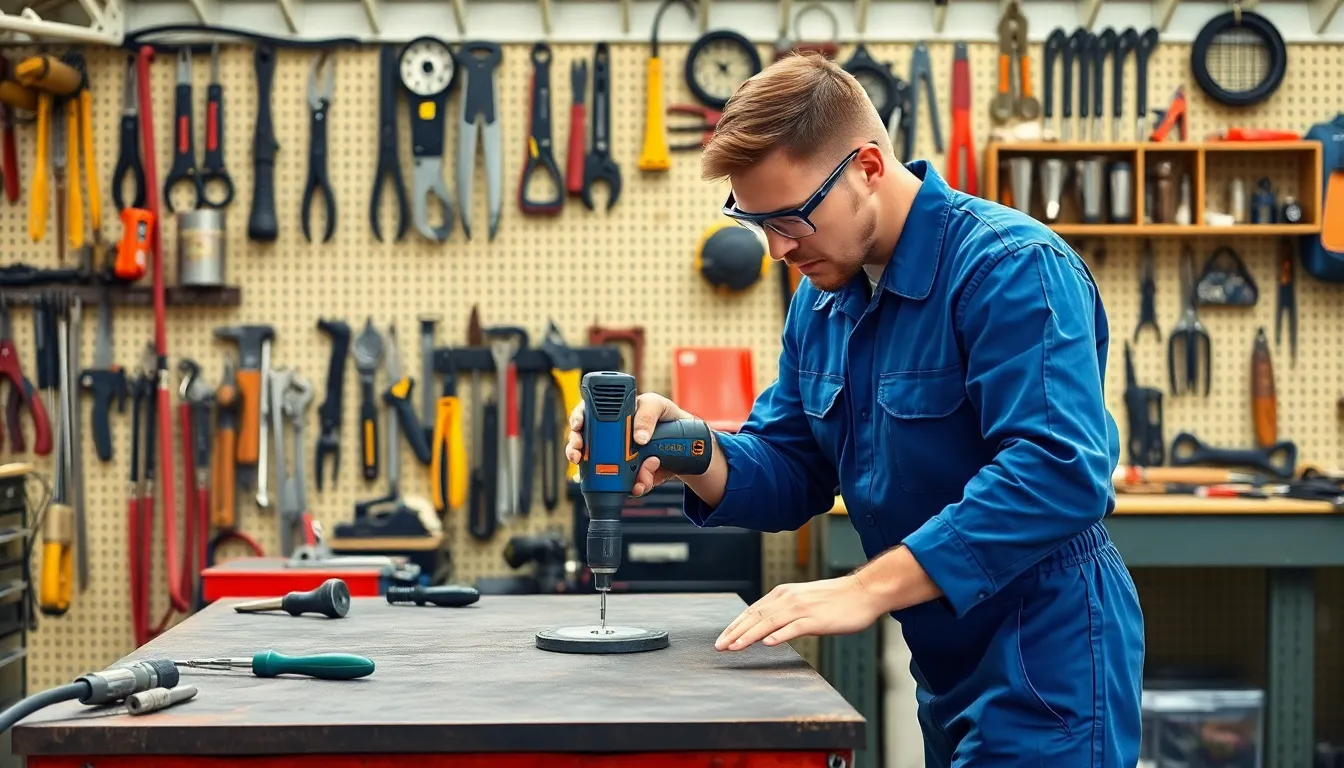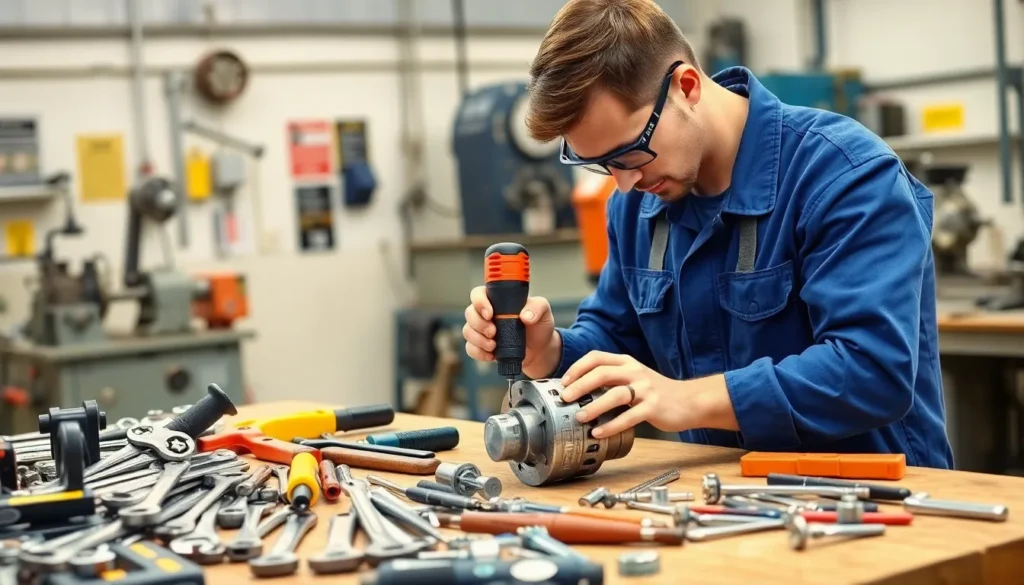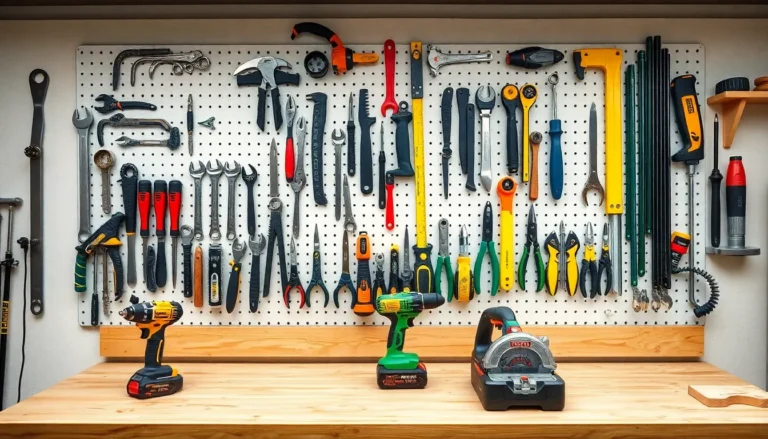In the world of mechanical workshops, tools are the unsung heroes, quietly transforming chaos into order. Whether it’s a wrench that tightens bolts or a drill that brings ideas to life, these tools are the backbone of every successful project. Without them, a mechanic’s dreams would be as flat as a deflated tire.
Table of Contents
ToggleOverview of Mechanical Workshop Tools
Mechanical workshop tools play a vital role in accomplishing various tasks. Primary tools include hand tools, power tools, and specialized equipment. Each tool serves a specific purpose, aiding mechanics in their daily operations and enhancing efficiency.
Hand tools, such as wrenches, screwdrivers, and pliers, offer versatility. These instruments enable users to perform tasks ranging from basic repairs to intricate assembly work. They are essential for both beginner and experienced mechanics.
Power tools, including drills, grinders, and saws, speed up tasks significantly. These tools require electricity or batteries, allowing for greater efficiency compared to manual options. Their use simplifies labor-intensive processes, enabling mechanics to tackle larger projects with ease.
Specialized equipment, like lathes and milling machines, fulfills specific functions in machining. These tools allow for high precision and quality control in manufacturing. Mechanics rely on these machines for creating complex components and tools.
Basic toolkits often contain a mixture of these tools, ensuring mechanics are prepared for various situations. A well-organized workspace enhances productivity and safety. Storing tools appropriately reduces accidents and maintains workplace efficiency.
Maintenance of tools ensures longevity and reliability. Regular checks, cleaning, and proper storage methods contribute to their performance. Mechanics who invest time in maintaining tools experience fewer disruptions during work.
Understanding the types and functions of mechanical workshop tools helps mechanics choose the right instruments for specific tasks. The effectiveness of any project hinges on the tools at a mechanic’s disposal. Quality tools enhance outcomes, leading to successful repairs and modifications in mechanical workshops.
Types of Mechanical Workshop Tools

Mechanical workshops utilize various tools, categorized into hand tools, power tools, and specialty tools. Each type plays a vital role in enhancing efficiency and precision in mechanical tasks.
Hand Tools
Hand tools serve fundamental functions in mechanical workshops. Common items include wrenches, screwdrivers, pliers, and hammers. Versatility characterizes these tools, enabling mechanics to perform tasks from basic repairs to detailed assembly work. Wrenches adjust nuts and bolts, while screwdrivers secure components tightly. Pliers grip and twist materials, and hammers effectively drive nails or break apart objects. Using a well-organized toolkit maintains accessibility and prolongs the lifespan of hand tools, ensuring mechanics work efficiently.
Power Tools
Power tools significantly increase the speed and efficiency of various tasks in workshop settings. Drills, grinders, and saws represent some essential power tools found in any mechanical workshop. Electric drills bore holes and drive screws rapidly, making them indispensable for assembly work. Grinders sharpen and shape materials, providing precise finishes. Saws enable quick cutting of various materials, improving productivity during fabrication. The right power tools simplify complex projects, allowing mechanics to focus on quality and craftsmanship.
Specialty Tools
Specialty tools address specific functions essential to advanced mechanical tasks. Lathes, milling machines, and diagnostic equipment exemplify these specialized tools. Lathes turn raw materials into precisely shaped components, enhancing accuracy in manufacturing. Milling machines create complex shapes by removing material from a workpiece, contributing to high-quality production. Additionally, diagnostic equipment identifies mechanical issues quickly, streamlining repair processes. Incorporating specialty tools into workflows allows mechanics to achieve greater precision and efficiency in their projects.
Selecting the Right Tools
Choosing the right tools is essential for efficient operations in a mechanical workshop. Mechanics must consider their specific needs and preferences to equip themselves effectively.
Considerations for Beginners
Beginners should focus on acquiring basic hand tools first. Wrenches, screwdrivers, and pliers help them perform essential tasks. Prioritizing quality over quantity significantly impacts tool longevity. An organized toolkit allows easy access to items during projects. Mechanics can gradually expand their collections with power tools, like drills and grinders, as they gain experience. Setting a budget ensures they make informed decisions without overspending. Learning proper maintenance techniques early helps preserve tool performance as skills develop.
Professional Tool Recommendations
For professionals, investing in high-quality brands makes a difference. Tools from manufacturers like Snap-on, DeWalt, and Milwaukee guarantee reliability and durability. Essential hand tools include adjustable wrenches and high-torque screwdrivers, enhancing versatility. Power tools, such as cordless drills and angle grinders, streamline workflows. Furthermore, specialized equipment like laser levels and hydraulic jacks allows for precision and efficiency. Mechanics benefit from ergonomic designs in tools that reduce fatigue during extended use. A comprehensive toolbox tailored to specific trades increases effectiveness on the job.
Maintenance of Mechanical Workshop Tools
Maintaining mechanical workshop tools ensures their longevity and functionality. Regular care keeps tools in excellent condition and ready for use.
Cleaning and Care
Regular cleaning prevents rust and accumulation of grime. After each use, wipe down tools with a clean cloth to remove dirt. For stubborn stains, a mild detergent with water suffices. Inspect tools for damage or wear, addressing issues promptly to avoid safety hazards. Lubricate moving parts frequently, as this enhances performance and reduces friction. Storing tools in clean environments minimizes exposure to elements that cause corrosion.
Storage Solutions
Effective organization extends tool lifespan. Utilizing a pegboard optimizes space and keeps tools accessible. Toolboxes with compartments ensure smaller items remain organized and easy to find. Magnetic strips can hold metal tools securely, freeing up workspace. Regularly check storage areas for cleanliness to prevent damage from dust or moisture. Labeling storage spaces adds clarity, improving workflow efficiency. Proper storage solutions streamline workshops, enhancing productivity and making tool retrieval straightforward.
Innovations in Mechanical Workshop Tools
Recent advancements in mechanical workshop tools enhance efficiency and productivity. Smart wrenches now feature digital displays that provide torque readings, allowing for precise adjustments. Ergonomic designs reduce strain and increase comfort during extended use, addressing common workplace concerns.
Advancements in power tools include brushless motors that extend battery life and improve performance. Battery-powered drills now deliver higher torque, making them suitable for demanding applications. Wireless technology enables tools to connect to smartphones for diagnostics and usage tracking, fostering better maintenance practices.
Specialized equipment sees innovations like CNC (Computer Numerical Control) machines, which offer increased accuracy in manufacturing processes. Lathes and milling machines equipped with automation capabilities reduce human error and enhance precision. Diagnostic tools are becoming more sophisticated, utilizing artificial intelligence to interpret data quickly, leading to faster repairs.
Additions such as laser levels improve alignment accuracy for various projects. Laser technology allows mechanics to achieve greater precision in installation tasks, aligning components effortlessly. Portable toolboxes and storage solutions incorporate smart organization features, enabling mechanics to locate tools easily.
Robotics is making its mark in workshops, with robotic assistants executing repetitive tasks. Automation reduces labor costs and speeds up production cycles, allowing for increased output. Augmented reality tools offer visual overlays for complex instructions, enhancing training and operational efficiency.
3D printing is gaining traction in workshop environments. It enables on-demand production of custom tools, reducing lead times and costs associated with manufacturing. These innovations reflect a shift toward smarter, faster, and more efficient workshop operations, ensuring mechanics remain equipped for future challenges.
Mechanical workshop tools are indispensable assets that empower mechanics to execute their tasks with precision and efficiency. The right combination of hand tools power tools and specialized equipment can transform a chaotic workspace into a well-oiled machine.
As technology continues to evolve the tools available are becoming smarter and more efficient which further enhances productivity. Investing in a well-organized toolkit and understanding the specific functions of each tool is essential for any mechanic aiming to excel in their craft.
Ultimately a comprehensive approach to tool selection and maintenance not only boosts performance but also prepares mechanics for the challenges of tomorrow’s projects.






